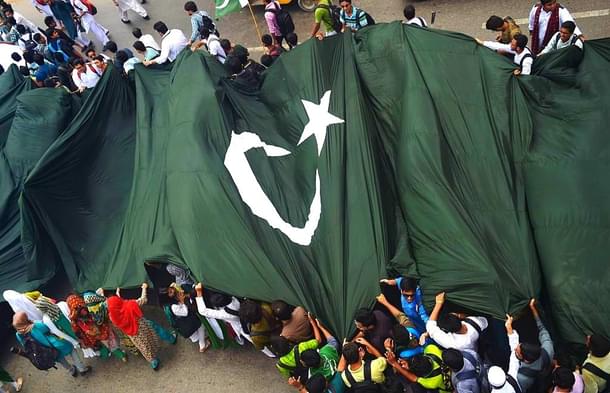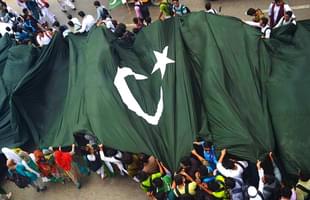World
Of Unaddressed Elephants And Pakistan
Vasud Torsekar
Mar 29, 2021, 03:17 PM | Updated 03:17 PM IST
Save & read from anywhere!
Bookmark stories for easy access on any device or the Swarajya app.


With the inauguration of President Biden, calls for a reset in the US-Pakistan relationship are growing louder.
Fraying around the edges since 2011, the ties between the two Cold War allies hit the nadir in 2018, when President Trump called out Pakistani “lies and deceit” on Twitter and suspended security assistance worth millions of dollars.
The assistance remains suspended despite the Pakistani role in delivering the Taliban to the negotiating table. And while calls for a reset are quite common with new leaders at the helm, there is much more to the timing than the change of guard in the US.
Since 2018, Pakistan has lost two of its primary sources of aid — the US and Saudi Arabia. With no relief in sight at the FATF either, it is trapped in a vicious circle of debt servicing. As the Afghan War draws to a close and the new US administration busies itself in the Indo-Pacific theatre, Pakistan is rapidly running out of leverage.
Staring squarely at yet another relapse into the spells of estrangement that have punctuated the US-Pakistan relations, it is looking to escape the sanctions and economic abandonment that are characteristic of these periods.
Although the limited goal of keeping Pakistan relevant in the American scheme of things is quite reasonable, it fails to address the countless proverbial elephants in the room and sweeps the mother of all those elephants — the dysfunctionality of the Pakistani state itself — under the carpet (a task, as Bernard Woolley of ‘Yes Minister’ would remind us, literally impossible).
And while a lot has been written about that as well, it does not seem to find much traction in the clamour for a reset. The recommendations that begin with the economic security paradigm eventually veer off into the hoary trope of ‘parity with India’ and its concomitants — ‘strategic depth in Afghanistan’ and ‘mediation with China’.
A reset in the US-Pakistan relations that overlooks the dysfunctionality of the Pakistani state, characterised by the obsessive focus on India, which has hijacked its domestic and international discourse and culminated in the capture of its state institutions by the Pakistani Army, is doomed to be a non-starter.
Appearing on various web-based events, Dr. Moeed Yusuf, Prime Minister Imran Khan’s advisor on National Security, said that the new vision of Pakistan is to prioritise connectivity and “development partnerships, not assistance” and to eschew the policy of leveraging its geostrategic position for international aid.
With this new paradigm of economic security as the basis for revival, are recommended a spate of measures, such as American investment in the Pakistani private sector, human development, as well as setting up of manufacturing facilities by American companies in Pakistan to enable access to Chinese markets, with a special focus on sectors like information technology, climate, energy, health and agriculture.
Ordinarily, foreign investment in the private sector of any country would not qualify as assistance. However, Pakistan is not just ‘any’ country. A large section of its private sector is hogged by a complex network of army-controlled entities like the Fauji Foundation that dabble in anything from producing breakfast cereals, cement, meat and fertilizers to managing enterprises in sectors like radio and TV entertainment, energy, petroleum and banking.
The odds that the US investment in the Pakistani “private sector” will not land in one of these enterprises are minuscule. What’s more, the security environment in the country is so precarious, with sectarian and other extremist groups running amok, that no foreign investment can be truly secure without the protection of the deep state that controls these elements.
The calls for prioritising and marketing “economic potential instead of banking on geostrategic location” ring hollow without any reference to the malignant influence of the military in the political sphere.
With these feeble attempts to establish economic cooperation as a basis for the reset, the discussions return to the pet projects of Pakistan — ‘parity with India’, ‘strategic depth in Afghanistan and ‘mediation with China’.
The reports recommend adoption of a “regional approach” to human rights and democracy challenges in South Asia and a “clear and unambiguous position” on India’s abrogation of Article 370, followed by a warning against Indian influence in Afghanistan.
On China, the US is advised to lure Pakistan away from CPEC through the Development Finance Corporation (DFC) and the Blue Dot Network, to seek Pakistani assistance for mediation with China and to even expand the concept of the Indo-Pacific to include Pakistan in it.
The expectations that Pakistan can get a genuine reset with the US without a change in its policy on India and Afghanistan are worrisome. At the same time, the recommendations on China and the Indo-Pacific are symptomatic of the gap in Pakistan’s assessment of the global outrage at China’s aggressive and opportunistic behaviour, as the world was busy dealing with the effects of Covid-19 pandemic.
And while none of this is unexpected, any impending reset with Pakistan must proceed with an eye on history. For more than 70 years, American economic assistance has been misappropriated by the Pakistani Army to consolidate its position and to weaken democratic institutions.
Ironically, the assistance has not prevented, what Madiha Afzal calls, the “strategic operationalisation of anti-American sentiment for political gain” by successive Pakistani governments.
The hatred for India, the US and Israel is so ingrained in the popular discourse that any attempt toward a non-zero-sum political solution on Kashmir or, for that matter, even the recognition of Israel, has become tantamount to political suicide.
Pakistan’s record on cracking down on the UN-designated terrorist groups, as well as their financial activities, is no less dismal. The recent acquittal of Omar Saeed Sheikh, a collaborator in the Daniel Pearl murder, is a case in point.
The state department needs to re-evaluate its Pakistan outlook based on these facts.
It is also time that the discourse moved beyond the solution-to-Afghanistan-lies-in-Kashmir theory. Twenty years of occupation and billions of dollars of American taxpayers’ money expended have not prevented Pakistan from providing sanctuaries to the Taliban in its pursuit of strategic depth in Afghanistan.
With the deadline for the complete withdrawal of American and NATO troops approaching amidst rising violence and targeted killings of civil society members in Afghanistan, the Biden administration has indicated that it is not satisfied with Taliban’s record on compliance with the conditions of the deal.
However, the notion that the final resolution of Kashmir dispute — albeit desirable in its own right — will bring stability in South Asia is a gross underappreciation of Pakistan’s revisionist agenda and its quest for thwarting India’s rise.
As the US works toward a final troop withdrawal and countering the malignant Chinese influence at the global level, it must steer clear of the chimerical hopes of weaning Pakistan away from China and Afghanistan based on Kashmir.
A US-Pakistan reset that is not informed by these factors is destined to be a cosmetic exercise.
The views expressed in the article are personal views of the writer and do not represent the views of the government of India.





